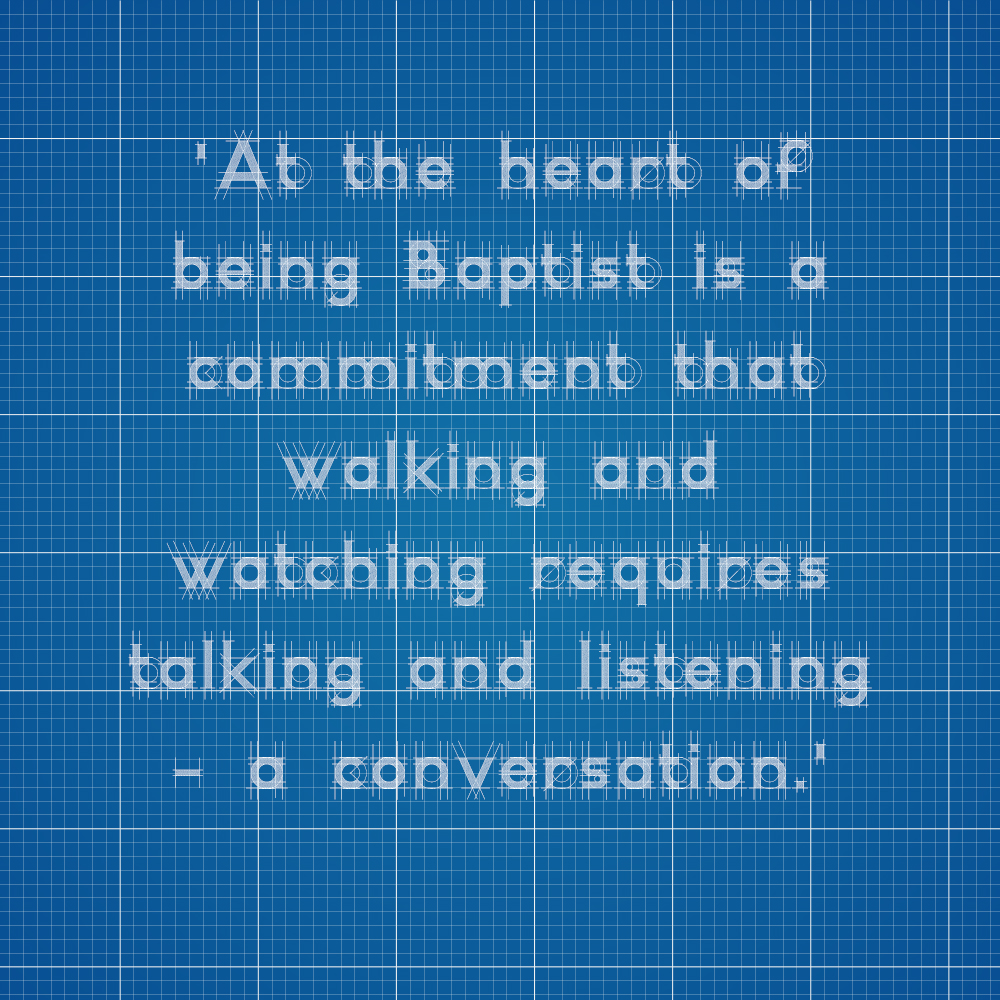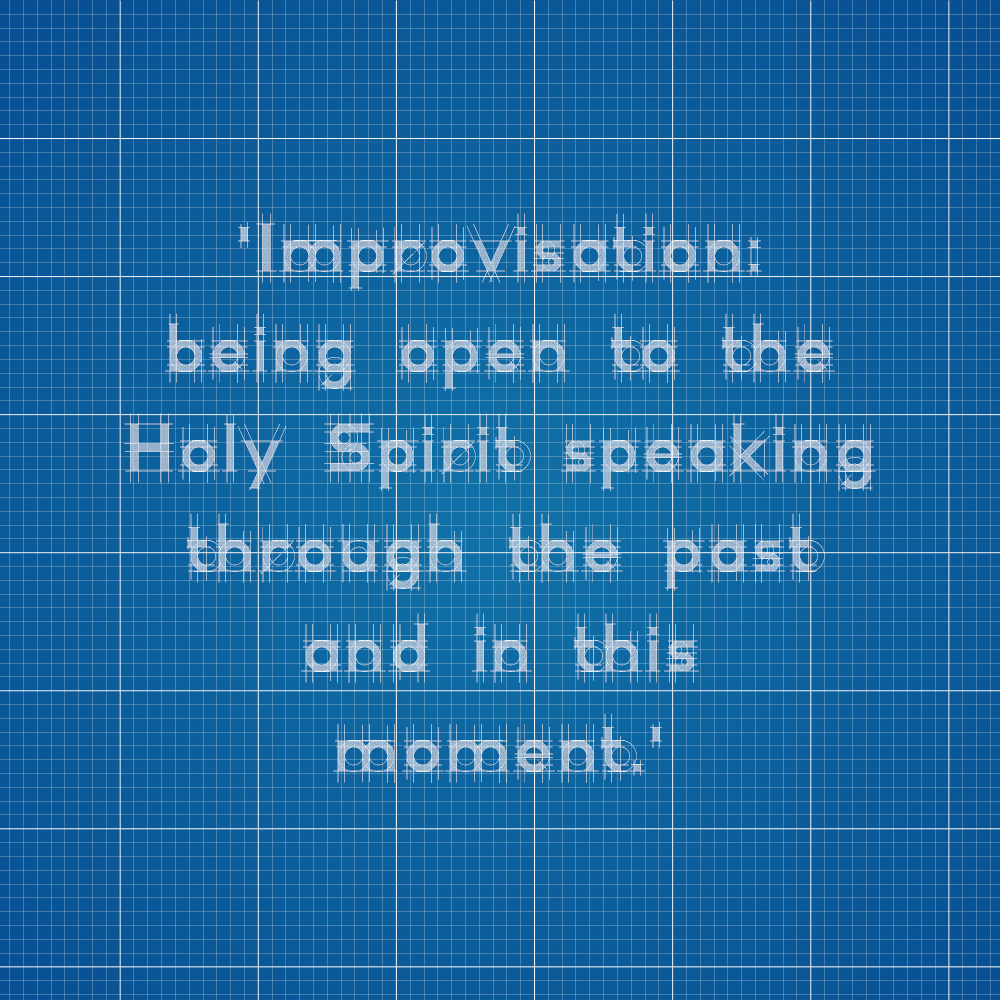
What does it mean to be Baptist?
Why we need to be both stewards and interrogators of our story, and - with the Spirit’s guidance - be open to improvisation. By Andy Goodliff
I wonder what is it to be a Baptist? I wonder what matters most? One Baptist has said that ‘to be Baptist is simply to participate in the conversation about what it means to be Baptist.’
1 It is suggestive of the early Baptist understanding that being Baptist was a commitment to ‘walking together and watching over another in ways known and to be made known.’ What has always been important to Baptists is the recognition that Christ calls us into fellowship, and with this an accompanying trust that Christ guides and empowers the local church for its life together. At the heart of being Baptist from its beginnings to its present is a commitment that walking and watching requires talking and listening — a conversation — which we usually name the church meeting. To be Baptist is to engage in conversation, blessed in the tie (Christ) that binds our hearts together in love. This doesn’t mean the conversation is all sweetness and light, there has been and is often disagreement and tension and occasionally (in the history of the Baptist Union) some have parted company, including one of the most famous Baptists, Charles Spurgeon himself.

Thirty-five years ago, in 1986, Brian Haymes published a little book called
A Question of Identity. It was something of a small bestseller in the Baptist world. Suddenly Baptist identity was on the agenda, it became the subject of discussion in the Baptist Union Council, and in the following decades Baptist theologians — among them Nigel Wright, Paul Fiddes and Steve Holmes — have put forward their own understandings of what makes us who we are.
Haymes’ little book began by noticing that Baptist identity was changing in ways which were both positive and negative. In the wider Christian world of the 1980s there was the growing impact of the charismatic movement, the ecumenical movement, an increased identification by many with the Evangelical Alliance, and at the same time a waning of a historic nonconformist identity (shared with the URC, Methodists and others). Likewise in the broader world there was an increasing individualism, marketization, and globalisation, which were altering our relationships in all directions.
As part of that Christian and wider world, Baptist identity was being shaken up. In 1991, Nigel Wright issued a ‘challenge to change.’ This was not something new, as Baptists have always been changing and each generation has to ask ‘who are we?’ We currently live in a context that is being changed by Brexit, a pandemic, and a renewed awareness of racial injustice. All of these should make us ask, who are we today?
We have to admit that all the conversation about Baptist identity since
A Question of Identity has not produced a settled answer to the question, and perhaps that is the point. There remains an on-going contestation about what is important and what matters. And here we must say ‘and ever was it so’. Baptists have always had something they were contesting whether it was hymn-singing, the doctrine of the Trinity, the Lord’s Supper, ecumenical membership; today’s conversation has more recently been focused on issues of human sexuality.
If it is right that to be a Baptist is to participate in a conversation, then the conversation cannot just look to what is happening around us, it also has to look back, which is to say we need to acknowledge tradition. The word tradition means that being Baptist was not something we invented, but is a (hi)story that started before us, over 400 hundred years ago. Being Baptist today means we walk in the tracks of those who have come before us. The understanding of our being church owes something to Thomas Helwys, Dorothy Hazzard, Charles Spurgeon, Ernest Payne, Fred George, Margaret Jarman, and many others. What does this mean for the conversation?
It means, I suggest, three things:
2
First it means, we need to be stewards of our story. In other words, we are those who believe it’s important to know the past, and to treasure the insights and practices our forebears laid down as a gift of Christ both then and now. To engage in Baptist history means we might avoid constantly reinventing the wheel and it can instil in us a sense of gratitude and humility as we uncover the wisdom and light that enables us to recognise a continuity in some form with earlier Baptists. We might mention here in broad terms, the practices of communal discernment; believers’ baptism; the shared reading of Scripture; associating with other churches; and a call to mission and evangelism.
Second, it means we also need to be interrogators of our story. By this I mean we see it for its gifts and for its failures. No tradition is pristine and perfect, and so it requires re-evaluation, a sifting of views and practices which overlooked or brought harm. Sometimes this will mean retelling the story, highlighting different persons or moments whose part has not been rightly acknowledged, eg the contributions made by women and persons of colour.
3 Sometimes it will mean a questioning of not only the past, but of the present too. It will admit that most of the thinking and writing on Baptist identity has largely been done by white men.
 Thirdly
Thirdly, it will learn to improvise. In his 2014 BMS Catalyst Live talk Glen Marshall showed how improvisation,
4 and with it imagination, is important for jazz to be jazz, but also for the church to be the church. Improvisation is a means of keeping the story going, continuing the conversation, and being open to the Holy Spirit speaking through the past and in this moment. The Baptist story is one that has undergone regular improvisation through its four hundred year history, from the embrace of singing, to overseas mission, women in ministry, to ecumenical partnership. Our story is not one that fixes things in unchanging Articles or Dogma, but at its best is always responding to what is happening within, around and coming to us. The witnesses of old fuel our imagination to faithful improvisation in the present. Tradition then is not dry and dusty, but is something living — Baptists are a living tradition. History is always just behind us and the future is always just ahead of us, and we live in a space that invites us to look back and to look forward, so the conversation of who we are and who God is calling us to be is one that has the character of truth, patience, humility, faith and hope.
‘We are pilgrims on a journey,’
5 summoned by God to walk together, to listen to and to talk with one another, as churches, associations, colleges and as a Union, with an open Bible, open hearts and minds to the Spirit’s guidance, treasuring and questioning our story, receptive to the stories of others (be they Baptist or not), so that we may become a community of trust that improvises our life with Christ together for the kingdom and God.
Pilgrim God,
thank you that you speak to us.
Help us to listen and talk together
that we might discern your way
for our time.
Thank you for the wisdom you give us in the witnesses of our past.
May the stories of their faithfulness and frailties,
inspire our imagination
to new faith and hope in Christ,
the source of our baptism
and pioneer of your mission.
Amen.
 Click here to download a pdf version of this article.
Click here to download a pdf version of this article.
Andy Goodliff is the minister of Belle Vue Baptist Church, Southend.
He is the author of Renewing a Modern Denomination: A Study of Institutional Baptist Life (2020)
1 Cited in Steven Harmon,
Baptist Identity and the Ecumenical Future (Baylor, 2016).
2 I borrow these three things from Mark Medley and his chapter in
Tradition and the Baptist Academy (Paternoster, 2011).
3 Part of the story of the last thirty years is the summons to be heard by women, persons of colour, those with a disability, and those who are LGBT.
4
bmscatalystlive.com/portfolio-item/glen-marshall-reading-2014
5 As the hymn ‘Brother, sister let me serve you’ puts it.
Illustration: www.shutterstock.com